-
 Bitcoin
Bitcoin $86,025.7359
-1.61% -
 Ethereum
Ethereum $1,920.3472
-5.26% -
 Tether USDt
Tether USDt $0.9997
-0.06% -
 XRP
XRP $2.2679
-4.30% -
 BNB
BNB $631.3338
0.61% -
 Solana
Solana $133.9087
-3.73% -
 USDC
USDC $0.9999
-0.02% -
 Dogecoin
Dogecoin $0.1844
-6.56% -
 Cardano
Cardano $0.7121
-3.64% -
 TRON
TRON $0.2304
-0.85% -
 Toncoin
Toncoin $3.9641
5.36% -
 Chainlink
Chainlink $14.7666
-5.44% -
 UNUS SED LEO
UNUS SED LEO $9.7865
0.11% -
 Avalanche
Avalanche $21.4347
-2.79% -
 Stellar
Stellar $0.2792
-4.47% -
 Sui
Sui $2.6886
0.12% -
 Shiba Inu
Shiba Inu $0.0...01344
-6.90% -
 Hedera
Hedera $0.1854
-5.05% -
 Polkadot
Polkadot $4.4361
-5.87% -
 Litecoin
Litecoin $90.4855
-3.60% -
 MANTRA
MANTRA $6.3866
-3.78% -
 Bitcoin Cash
Bitcoin Cash $314.3284
-7.16% -
 Bitget Token
Bitget Token $4.8551
-4.23% -
 Pi
Pi $0.8502
1.35% -
 Dai
Dai $1.0000
-0.01% -
 Ethena USDe
Ethena USDe $0.9987
-0.06% -
 Hyperliquid
Hyperliquid $14.0422
-2.78% -
 Monero
Monero $222.7193
-0.35% -
 Uniswap
Uniswap $6.5327
-4.02% -
 NEAR Protocol
NEAR Protocol $2.8918
-5.10%
How to avoid duplicate payments when transferring money through Ethereum wallet?
Avoid duplicate Ethereum payments by using transaction monitoring tools, waiting for sufficient confirmations (at least six), and choosing an appropriate gas price. Reputable wallets and exchanges offer added security features.
Mar 26, 2025 at 07:21 am
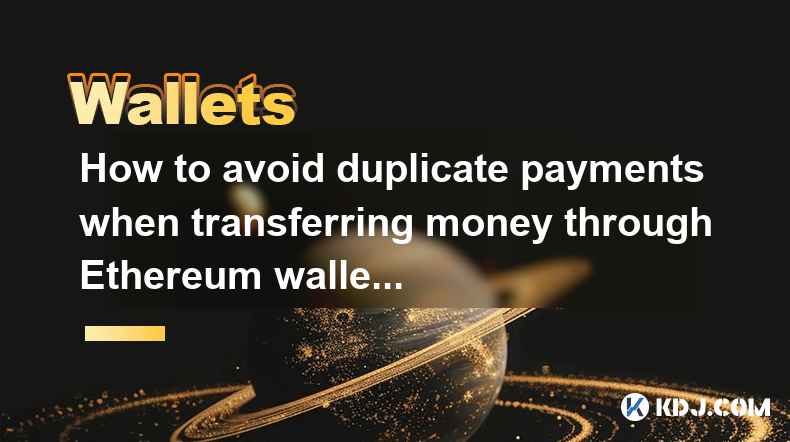
How to Avoid Duplicate Payments When Transferring Money Through Ethereum Wallet?
Transferring cryptocurrency, especially on a network like Ethereum, carries a risk of duplicate transactions. This happens when a transaction is broadcast, but the sender isn't certain if it's been confirmed. They might then resend the transaction, leading to double spending. Understanding how to mitigate this risk is crucial for secure Ethereum transactions.
One of the most effective ways to avoid duplicate payments is to utilize transaction monitoring tools. These tools allow you to track the status of your transactions in real-time. By observing the transaction's progress through the network, you can avoid resending it unnecessarily. Many wallets integrate this functionality, or you can use third-party block explorers.
Another crucial aspect is understanding Ethereum's transaction confirmation mechanism. A single confirmation doesn't guarantee finality. Ethereum employs a probabilistic confirmation system. The more confirmations a transaction receives, the lower the probability of it being reversed. Waiting for a sufficient number of confirmations reduces the risk significantly.
Choosing the right gas price is another vital step. A low gas price can lead to your transaction being stuck in the mempool (the pending transaction pool) for an extended period. This can lead to uncertainty about the transaction's status, tempting you to resend it. A higher gas price generally ensures faster processing. However, you should avoid excessively high gas prices, as this can be inefficient.
Using reputable Ethereum wallets is essential. Well-established wallets usually have built-in safeguards against duplicate transactions. These safeguards might include confirmation notifications and warnings against resending transactions that are already in progress. They may also offer transaction history tracking to help you keep tabs on your transfers.
Reputable exchanges often provide more robust transaction management features compared to individual wallets. These features might include real-time transaction tracking, order cancellation options, and other tools to help prevent accidental duplicate payments. Using an exchange can add a layer of security to your transactions.
Careful double-checking of recipient addresses is paramount. Sending funds to the wrong address is a common mistake, leading to irreversible loss of funds. Verifying the address multiple times before confirming the transaction is a crucial step in preventing costly errors.
Understanding the concept of nonce is also important. The nonce is a number that prevents duplicate transactions. Each transaction must have a unique nonce. Most wallets automatically handle nonces, but it's helpful to understand their function to troubleshoot potential issues.
For enhanced security, consider using a hardware wallet. These devices store your private keys offline, reducing the risk of unauthorized access and accidental transactions. This added layer of security minimizes the chance of duplicate transactions arising from unauthorized activity.
Finally, understanding the limitations of the Ethereum network is crucial. Network congestion can sometimes lead to delayed confirmations, potentially causing users to mistakenly resend transactions. Being aware of network conditions can help you manage expectations and avoid impulsive actions.
Staying informed about the latest security best practices and updates within the Ethereum ecosystem is beneficial. Regularly checking for updates to your wallet software and staying aware of any security advisories can help prevent issues related to duplicate payments.
Frequently Asked Questions:
Q: What happens if I accidentally send a duplicate Ethereum transaction?
A: If you send a duplicate transaction, the first transaction will likely be processed. The second transaction might be processed, leading to a loss of funds. The outcome depends on the gas price and network congestion.
Q: How many confirmations should I wait for before considering a transaction final?
A: While there's no single magic number, waiting for at least six confirmations is generally considered a safe practice. The more confirmations, the lower the risk of reversal.
Q: Can I cancel an Ethereum transaction after I've sent it?
A: You cannot directly cancel an Ethereum transaction once it's been broadcast. However, if it's still pending, a higher gas fee might help it process faster.
Q: What if my transaction is stuck in the mempool?
A: If your transaction is stuck, increasing the gas price might help it get processed. You can also monitor its status using a block explorer. If it remains stuck for an extended period, contact your wallet provider or exchange for assistance.
Q: Are all Ethereum wallets equally secure regarding duplicate transactions?
A: No, the security features vary significantly between different wallets. Reputable wallets with robust transaction management tools generally offer better protection against duplicate transactions. Always choose a reputable wallet from a trusted source.
Disclaimer:info@kdj.com
The information provided is not trading advice. kdj.com does not assume any responsibility for any investments made based on the information provided in this article. Cryptocurrencies are highly volatile and it is highly recommended that you invest with caution after thorough research!
If you believe that the content used on this website infringes your copyright, please contact us immediately (info@kdj.com) and we will delete it promptly.
- The cryptocurrency market finds itself once again fixated on XRP
- 2025-03-28 13:55:11
- Flamingo Finance Launches FLOCKS, a Multi-Asset, Dividend-Bearing Token
- 2025-03-28 13:55:11
- Bitcoin (BTC) Price Prediction: Surge to $260,000 This Bull Cycle
- 2025-03-28 13:50:12
- Bitcoin (BTC) Faces Market Pressures as Short-Term Holders Experience Losses
- 2025-03-28 13:50:12
- SUI, a prominent layer-1 cryptocurrency, has been gaining considerable momentum after bouncing off local lows around $2.5
- 2025-03-28 13:45:11
- SUI Price Shows Signs of a Potential Breakout as Analysts Point to Bullish Technical Patterns
- 2025-03-28 13:45:11
Related knowledge
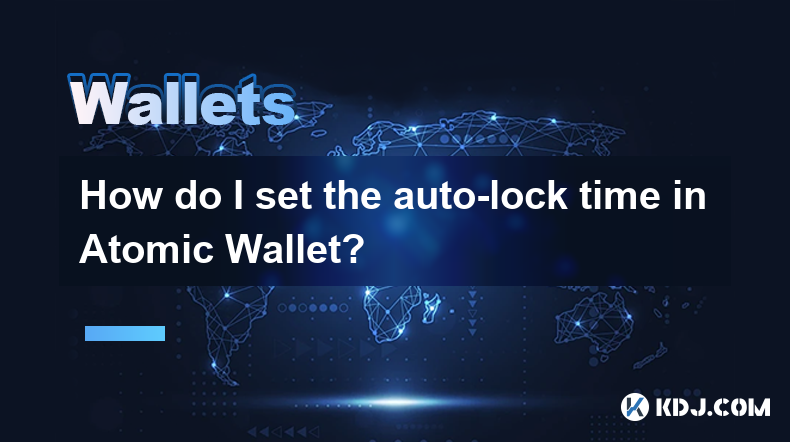
How do I set the auto-lock time in Atomic Wallet?
Mar 28,2025 at 07:35am
Understanding Atomic Wallet's Auto-Lock FeatureAtomic Wallet prioritizes security. A key aspect of this is its auto-lock feature, which automatically locks your wallet after a period of inactivity. This prevents unauthorized access to your funds should your device be compromised or left unattended. The auto-lock time is customizable, allowing you to ba...
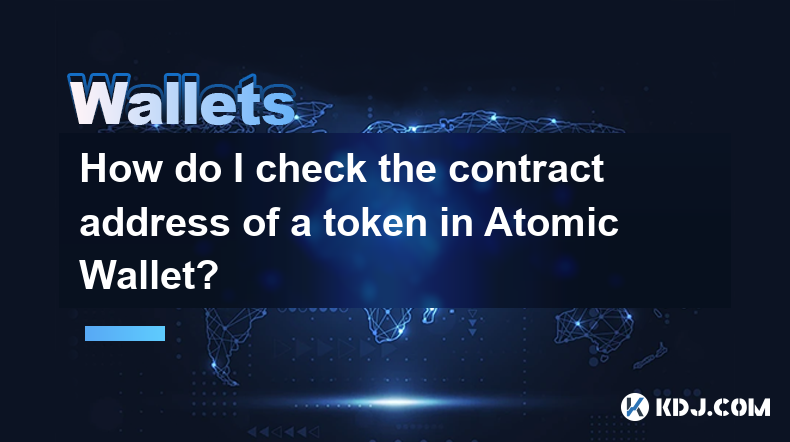
How do I check the contract address of a token in Atomic Wallet?
Mar 28,2025 at 07:49am
Locating Token Contract Addresses within Atomic WalletAtomic Wallet, a popular multi-currency wallet, doesn't directly display the contract address of a token within its main interface in the same way some other wallets might. This is because Atomic Wallet prioritizes user-friendliness, focusing on simplifying the user experience rather than displaying...
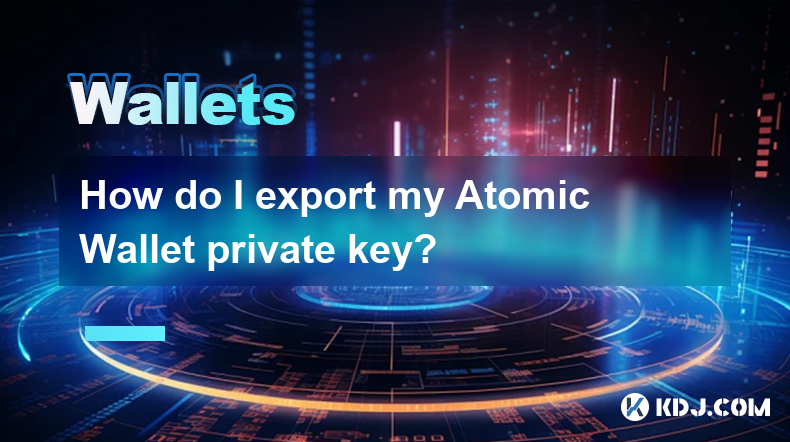
How do I export my Atomic Wallet private key?
Mar 27,2025 at 05:28pm
Atomic Wallet prioritizes security, and therefore, directly exporting your private key is not a feature offered within the wallet interface. This is a crucial security measure to protect your funds from unauthorized access. If someone gains access to your private key, they gain complete control over your cryptocurrency holdings. The wallet's design emp...
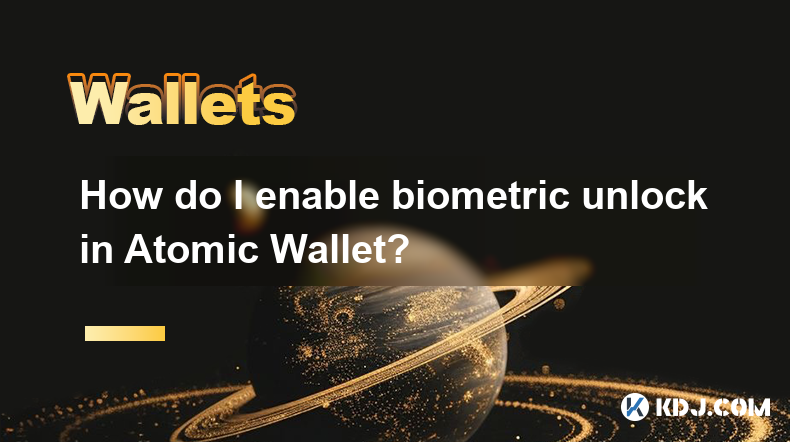
How do I enable biometric unlock in Atomic Wallet?
Mar 28,2025 at 02:14am
Biometric Authentication in Atomic Wallet: A Step-by-Step GuideAtomic Wallet offers a convenient security feature: biometric authentication. This allows you to access your wallet using your fingerprint or facial recognition instead of typing your password every time. This enhances security and convenience, but remember, it's an additional layer of secu...
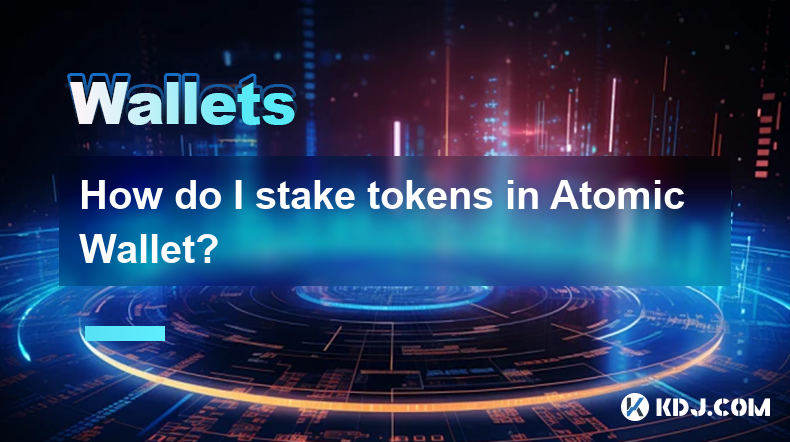
How do I stake tokens in Atomic Wallet?
Mar 27,2025 at 08:00pm
Understanding Atomic Wallet StakingAtomic Wallet offers a user-friendly interface for staking various cryptocurrencies. Staking allows you to earn passive income by locking up your tokens to support the network's security and validation. The rewards vary depending on the specific cryptocurrency and the network's conditions. Before you begin, ensure you...
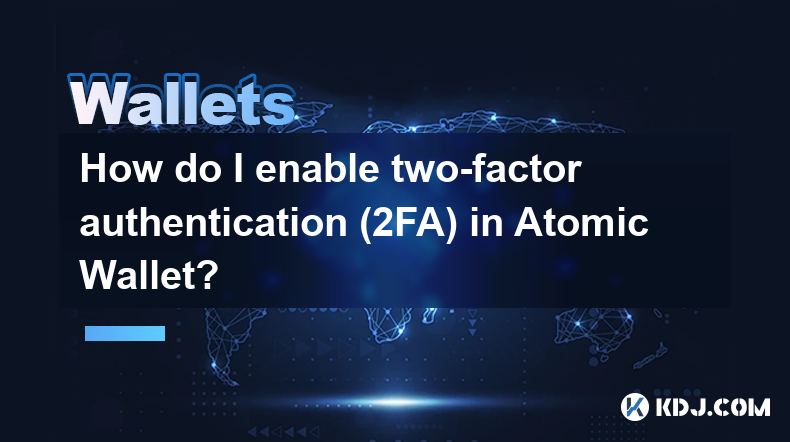
How do I enable two-factor authentication (2FA) in Atomic Wallet?
Mar 28,2025 at 04:56am
Enabling Two-Factor Authentication (2FA) in Atomic Wallet: A Step-by-Step GuideAtomic Wallet, a popular cryptocurrency wallet, prioritizes user security. Two-Factor Authentication (2FA) adds an extra layer of protection against unauthorized access, significantly reducing the risk of theft. This guide details how to enable 2FA within the Atomic Wallet a...

How do I set the auto-lock time in Atomic Wallet?
Mar 28,2025 at 07:35am
Understanding Atomic Wallet's Auto-Lock FeatureAtomic Wallet prioritizes security. A key aspect of this is its auto-lock feature, which automatically locks your wallet after a period of inactivity. This prevents unauthorized access to your funds should your device be compromised or left unattended. The auto-lock time is customizable, allowing you to ba...

How do I check the contract address of a token in Atomic Wallet?
Mar 28,2025 at 07:49am
Locating Token Contract Addresses within Atomic WalletAtomic Wallet, a popular multi-currency wallet, doesn't directly display the contract address of a token within its main interface in the same way some other wallets might. This is because Atomic Wallet prioritizes user-friendliness, focusing on simplifying the user experience rather than displaying...

How do I export my Atomic Wallet private key?
Mar 27,2025 at 05:28pm
Atomic Wallet prioritizes security, and therefore, directly exporting your private key is not a feature offered within the wallet interface. This is a crucial security measure to protect your funds from unauthorized access. If someone gains access to your private key, they gain complete control over your cryptocurrency holdings. The wallet's design emp...

How do I enable biometric unlock in Atomic Wallet?
Mar 28,2025 at 02:14am
Biometric Authentication in Atomic Wallet: A Step-by-Step GuideAtomic Wallet offers a convenient security feature: biometric authentication. This allows you to access your wallet using your fingerprint or facial recognition instead of typing your password every time. This enhances security and convenience, but remember, it's an additional layer of secu...

How do I stake tokens in Atomic Wallet?
Mar 27,2025 at 08:00pm
Understanding Atomic Wallet StakingAtomic Wallet offers a user-friendly interface for staking various cryptocurrencies. Staking allows you to earn passive income by locking up your tokens to support the network's security and validation. The rewards vary depending on the specific cryptocurrency and the network's conditions. Before you begin, ensure you...

How do I enable two-factor authentication (2FA) in Atomic Wallet?
Mar 28,2025 at 04:56am
Enabling Two-Factor Authentication (2FA) in Atomic Wallet: A Step-by-Step GuideAtomic Wallet, a popular cryptocurrency wallet, prioritizes user security. Two-Factor Authentication (2FA) adds an extra layer of protection against unauthorized access, significantly reducing the risk of theft. This guide details how to enable 2FA within the Atomic Wallet a...
See all articles

























![BONK COIN PRICE PREDICTION [ GETTING GASSED OUT !! ] BONK COIN PRICE PREDICTION [ GETTING GASSED OUT !! ]](/uploads/2025/03/28/cryptocurrencies-news/videos/bonk-coin-price-prediction-gassed/image-1.jpg)





























































